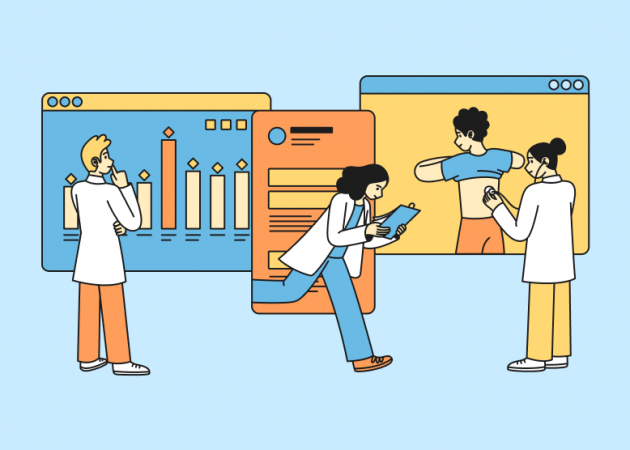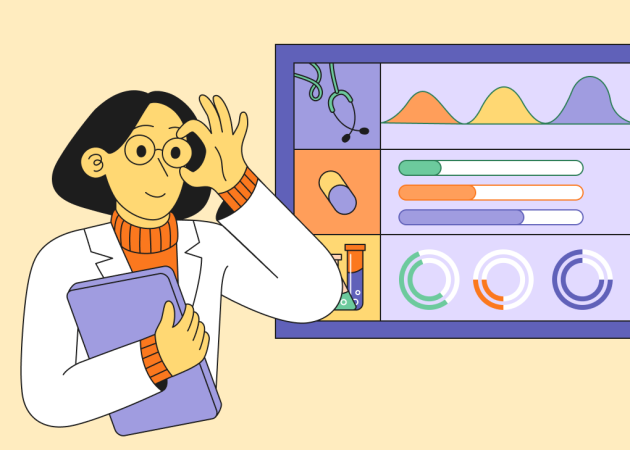
AI Technology in Healthcare: Top 10 Rising Medical AI Startups to Watch in 2023
Contents
Contents
Artificial intelligence (AI) is taking most industries by storm in one way or another — but perhaps its most significant impact can be felt in health technology. With medical science advancing, the role of AI in healthcare is growing, transforming how we diagnose, treat, and monitor patients.
According to market projections, the global AI in healthcare market is expected to reach $12.63 billion by the end of 2023, and this figure should grow even further to an impressive $187.76 billion by 2031. Given that healthcare technology is a relatively new industry and many Health- and MedTech startups emerge or raise substantial funding virtually every week, these projections will likely continue to change.
What is artificial intelligence in healthcare?
The applications of AI in healthcare are extensive — from early detection through radiological image analysis to clinical outcome prediction using electronic health records. Medical professionals can quickly and accurately analyze large amounts of clinical data by using machine learning (ML), natural language processing (NLP), deep learning (DL), and other AI-powered tools to identify disease markers and patterns that might otherwise have gone unnoticed.
By integrating AI technology and advanced algorithms into hospitals and clinics worldwide, healthcare systems can become more efficient and deliver high-quality patient care at scale while reducing provider costs and improving the accessibility of medical services. Just a few examples of AI use cases in healthcare:
- Training advanced models for image processing to detect early signs of cancer and other diseases on scans;
- Identifying patterns by analyzing large amounts of genetic data and using them to improve patient treatment and health outcomes;
- Integrating data from various sources to provide intelligence;
- Recognizing inefficiencies in the operational processes of healthcare providers;
- Implementing task automation to free up time for patient care.
The recent pandemic and the subsequent shortage of medical workers have highlighted the need for a resilient healthcare system. With our population expanding and aging, the reliance on health systems will only increase, so integrating artificial intelligence in healthcare and medicine may quickly become not just a nice-to-have feature but a vital necessity.
What are the benefits of AI in healthcare?
The healthcare domain has seen significant efficiency improvements thanks to AI technology, which has automated various tasks and helped better manage patients and resources. Today’s applications of AI in healthcare are already driving positive impacts in the health systems, including:
- Early diagnosis. AI-driven tools help analyze patient data to understand their health history and current conditions, aiding accurate diagnoses and predicting potential health issues by comparing disease information.
- Improved efficiency and cost. AI-driven systems enable swift and precise identification of biomarkers, expediting the diagnostic process. Integrating AI-powered tools can improve healthcare efficiency, reduce costs, and lead to better patient outcomes by automating administrative tasks and minimizing human error.
- Unique surgical assistance. Advanced AI technology has dramatically enhanced robotic applications, particularly in surgery. Machine learning accounts for the precise execution of complex surgical procedures while minimizing side effects, such as blood loss and post-operative pain, resulting in quicker and easier patient recovery.
- Enhanced human abilities and well-being. Robots now assist medical staff in patient care and improve patients’ comfort and safety. Robotic exoskeletons aid in the rehabilitation of paralyzed patients, helping them regain mobility and reduce their reliance on caregivers. Similarly, AI-powered smart prostheses offer users more responsive functionality. Companion and conversational robots can handle daily tasks, perform tests, and provide companionship to patients through machine learning services, which are especially invaluable in elderly care and improving mental well-being.
Before we dive into our quick rundown of healthcare startups that utilize advanced AI technologies, it’s worth mentioning that big players like Microsoft, Nvidia, IBM, Oracle, and Alphabet are also heavily investing in AI solutions for the healthcare sector, meaning we can anticipate some exciting developments in this field in the coming years.
Top 10 MedTech startups leveraging AI technology in healthcare
Babylon Health: AI-driven, digital-first primary care service
Country: United Kingdom
Babylon Health employs AI technology to make healthcare more affordable and accessible. Their cutting-edge AI platform aids physicians and nurses in making informed decisions and provides advanced health insights to patients and care providers. One of the tools, Babylon Advisor, uses data to customize individual care plans. Babylon’s HealthIQ leverages machine learning to identify and recommend optimal evidence-based interventions with the Babylon Advisor. Another feature, Health Graph, uses clinical data from over 100 sources to give a comprehensive, 360-degree view of a patient’s health and well-being.
Freenome: Next-generation early cancer detection
Country: USA
Freenome is a cutting-edge platform that leverages AI to design healthy conditions for an individual based on their cell-free genome. The company is revolutionizing early cancer detection through next-generation blood tests powered by a proprietary multiomics platform that combines deep molecular biology expertise and machine learning. Freenome’s ultimate goal is to discover the earliest warning signs and develop accessible tests to detect cancer in its most treatable stages. They also partner with health systems to integrate actionable insights and create a feedback loop between care and science.
Olive AI: Revenue cycle automation for healthcare professionals
Country: USA
Olive AI provides an advanced AI-based tool that empowers healthcare organizations to automate various tasks, including order management, eligibility, prior authorizations, claims processing, and more. Olive AI’s advanced features are built on a modern architecture with standardized, interconnected technology that sets it apart from other solutions. With industry-leading AI and machine learning, Olive evaluates healthcare data using a powerful intelligence engine, enabling faster progress for healthcare organizations: providers can proactively reduce patient leakage and denials while maximizing revenue capture.
Neko Health: AI-powered holistic body mapping
Country: Sweden
Neko Health, a Stockholm-based company, has developed a revolutionary concept in medical scanning technology. This approach uses AI and the latest sensor technology to create non-invasive and affordable examinations (Body Scans) to collect comprehensive health data for patients. In partnership with clinicians, researchers, and universities, Neko Health develops medical technology that can enable a new type of care. With Neko’s Body Scan service, more than 70 sensors are used to collect detailed health data. This whole-body mapping procedure gathers and analyzes over 50 million data points from a person’s body. It provides a complete picture of their cardiovascular health, skin spots, and birthmarks, allowing patients to identify and track individual risk factors and monitor overall health.
BrainSightAI: AI & ML-aided brain mapping
Country: India
BrainSightAI is a healthtech company that has made it to the list of top startups in India. It leverages AI and ML for brain mapping to diagnose and predict neurological and psychiatric problems. By merging artificial intelligence and neuroscience, BrainSightAI enables higher precision in detecting these disorders with high levels of accuracy. Their MRI-based SaaS platform offers greater precision in the neurological and psychiatric investigation. It is designed to help patients shorten their path to recovery and good health by leaping from informed estimation to data-assured diagnosis and predictions.

Insitro: Integrating ML and bioscience for drug R&D
Country: USA
Insitro leverages machine learning for drug discovery and development. They collect genetic, phenotypic, and clinical data to build predictive disease models. By combining patient-derived stem cells, genome editing, and ML algorithms, they create in vitro models of disease that are highly predictive of human clinical outcomes. Insitro’s models allow them to differentiate between cell states and predict disease-relevant clinical traits, discovering previously unseen disease subtypes and interventions to improve health. Insitro’s team also has extensive experience in advancing new medicines, identifying disease-modifying targets, and driving new insights on biomarkers and clinical development strategies.
Sweetch: AI-powered remote health platform
Country: Israel
Sweetch is an AI-based platform for large-scale prediction, prevention, and outcome improvement of chronic diseases and comorbidities, including diabetes, prediabetes, hypertension, hyperlipidemia, coronary artery disease, autoimmune, and more. The holistic Sweetch platform combines behavioral science with AI & EI (emotional intelligence), adapting to every individual’s behavior and personality and helping them to develop a healthier lifestyle. Sweetch’s fully automated digital therapeutic solution requires zero human intervention and dynamically supports multiple chronic conditions within one integrated platform.
DoMore Diagnostics: Personalized cancer diagnostics
Country: Norway
DoMore Diagnostics aims to revolutionize cancer diagnostics with AI to enhance patient care and drug development. The company was founded to address the need for innovative precision medicine techniques that cater to individual cancer patients based on university research and focusing on deep learning in histology image analysis. The automated histotyping provides accurate and unbiased prognostic information about patient outcomes, enabling better therapy selection and avoiding over- or undertreatment.
Metagenomi: AI-enabled genetic medicines discovery
Country: USA
Metagenomi is a company that is revolutionizing the gene editing industry. As pioneers in metagenomics, Metagenomi leverages machine learning to discover novel genome editing systems and cure diseases through precision gene editing tools. They are already applying their gene editing technologies to immuno-oncology programs developed by experts in the field. Using an AI-enabled discovery process, they have formed the most extensive library of novel CRISPR nucleases. Their proprietary sampling, high-speed screening, sequencing, AI-based cloud computing, and algorithms allow them to quickly identify highly efficient systems.
Octopus.Health: AI system for patient management and engagement
Country: Israel
Octopus.Health utilizes advanced AI-based technology to provide a comprehensive patient engagement and management platform that helps healthcare providers improve adherence and clinical outcomes while reducing their workload. The system uses machine learning algorithms to identify interventions for each patient based on clinic quality measures and patient adherence behaviors. Through continuous analysis of each patient’s behavior profile, the platform powers personalized communication with patients across selected communication channels and messaging services. Octopus.Health’s platform includes features for routine checkups, medication management, vaccination management, preventive health measures, patient feedback management, and more.
What is the future of AI usage in the healthcare industry?
It is estimated that by 2050, a quarter of the population in Europe and North America will be over 65 years old, meaning that there will be a significant increase in patients with complex needs. As a result, health systems will need to shift towards a more proactive approach to long-term care management rather than focusing on episodic care. The use of artificial intelligence in healthcare will inevitably become more common.
This year’s AI investments in healthcare have skyrocketed. In March 2023, the UK government invested $17 million in AI research for cancer checks, rare disease diagnosis, identifying high-risk women for premature births, and improving overall diagnosis speed and accuracy. Similarly, in September 2022, the NIH announced a $130 million investment over four years to enhance AI use in biomedical and behavioral research.
The market is expected to grow by nearly 15x from 2023 to 2031, driven by the need for cost-effective and efficient healthcare solutions. AI technology, such as predictive analytics and natural language processing, is already penetrating the healthcare domain and is set to improve population health management, operations, and innovation. Generative AI, capable of creating realistic content, also sparks a generational change in AI and has potential uses across all healthcare segments.
While technology holds immense potential, it’s important to remember that its most powerful use is to enhance human capabilities, not replace them, and be mindful of the ethical aspects of how AI is being used in sensitive domains. The heart of connected care is people, both those who need care and those who deliver it.
As an impact-oriented software development company, we take great pride in partnering with like-minded healthcare organizations worldwide. We believe that harnessing the power of technology for the greater good has the potential to lead to breakthrough discoveries and build successful products that will have a lasting impact on the next generations. And we’ll be happy to assist you on this journey.
Subscribe to blog updates
Get the best new articles in your inbox. Get the lastest content first.
Recent articles from our magazine
Contact Us
Find out how we can help extend your tech team for sustainable growth.





